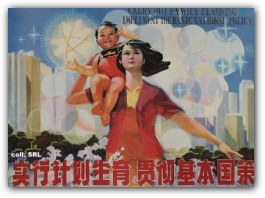The great failure goes on
- FATHER RAYMOND J. DE SOUZA
Oct. 1, 2009, marked the 60th anniversary of communist rule in mainland China. To mark the occasion, Father Raymond J. de Souza examines the countrys failed promise.
 |
In a century chock full of dark days, Oct. 1, 1949, stands among the worst. The bloodshed of two world wars, the horror of the Holocaust, the rise of totalitarian fascism and communism, the detonation of atomic bombs, the enslavement of half of Europe behind the Iron Curtain -- surely this was enough for the first half of history's bloodiest hundred years? Alas, no. The creation of the People's Republic of China on this day 60 years ago was a sign at the century's midpoint that the bloodshed was not about to stop.
During the first thirty years of its existence, the PRC was arguably the worst place on Earth to live. Grinding poverty abounded in many parts of the world, but Chairman Mao added catastrophic development schemes and a special measure of brutality. The victims of Chinese communism measured in the tens of millions, not counting the imprisoned and those condemned to forced labour. Secret police surveillance, informants betraying family and professional ties, and the full panoply of "re-education" measures destroyed the ancient traditions of Chinese civilization.
In the communist mind one must break a few eggs to make omelettes, but it's quite another thing to slaughter the chickens en masse. Which came first -- the dead chicken, or the lack of eggs? Mao's wickedness gave even the most enthusiastic communist fellow-travellers some pause.
So when Deng began his reforms in 1978, the PRC found itself with plenty of cheerleaders. As our series on the PRC at 60 has made clear, the second 30 years are widely celebrated as a period of rapid economic growth. Shed of the excesses of Maoism, China now finds itself held up as a model of development and an emerging superpower.
"With Western countries retreating from the free market themselves, and using massive state intervention, China's model of economic development guided by a state-dominated industrial policy and combined with authoritarian politics, suddenly looks more enticing," wrote Joshua Kurlantzick in these pages on Monday.
Such is the foolishness one regularly finds written about China. Enticing model? Deng's great reforms have accomplished something very modest. An entirely poor country has developed a sizable aspiring middle class -- no small achievement. But two-thirds of the Chinese population -- a staggering 800 million people -- are still very poor. Other countries in Asia have achieved as good or better economic results since 1949 -- including Japan and India.
Meanwhile, life in the PRC means having no freedom of religion or expression, and experiencing the full powers of the arbitrary police state, even if they are used more sparingly. China has enormous ecological problems, and the one-child policy -- the hallmark of the PRC's second thirty years -- has wreaked havoc with its human ecology. State regulation of family size -- breeding licenses, forced sterilization, coerced abortions -- is a massive, systematic violation of human rights, even if human rights advocates prefer to avert their eyes. Only the wilfully blind can ignore the results: tens of millions of Chinese girls aborted or left to die, with the consequent social problem of tens of millions of Chinese men with no prospect for marriage; generations of Chinese for whom brothers, sisters, uncles and aunts do not exist; a society older than even the shrivelling populations of Europe; and a social welfare state that will soon be overwhelmed by the indigent sick and elderly.
But two-thirds of the Chinese population -- a staggering 800 million people -- are still very poor. |
Japan will soon be the oldest society in history. China will be second. Japan will try this dangerous experiment as a rich country. China will attempt it as a poor one. There is perhaps a decade, at most two, before China's violence to its own demography will means hundreds of millions of elderly people dying with no one to adequately take care of them.
China's sheer size means that even the most modest advances mean great opportunities in terms of markets, exports and investment. Yet on almost every other measure of human development, the PRC falls far behind almost all its Asian neighbours, who managed to achieve economic development without the "enticements" of authoritarian repression. The epic tragedy of the PRC is proven by simply looking at what the Chinese have accomplished wherever they do not live under Beijing's rule: Hong Kong until 1997, Taiwan, Singapore, not to mention Vancouver and Toronto, as Canadians well know.
The second 30 years have been far better than the first thirty for the PRC, if only because the regime no longer engages in the mass slaughter of its citizens. China is no longer the worst place in the world to live. But compared to what might have been, the PRC is the last great failure of the 20th century that endures into the 21st.
 This is Meaghen Gonzalez, Editor of CERC. I hope you appreciated this piece. We curate these articles especially for believers like you.
This is Meaghen Gonzalez, Editor of CERC. I hope you appreciated this piece. We curate these articles especially for believers like you.
Please show your appreciation by making a $3 donation. CERC is entirely reader supported.

Acknowledgement
Father Raymond J. de Souza, "The great failure goes on." National Post, (Canada) October 1, 2009.
Reprinted with permission of the National Post and Fr. de Souza.
The Author
Father Raymond J. de Souza is the founding editor of Convivium magazine.
Copyright © 2009 National Post



